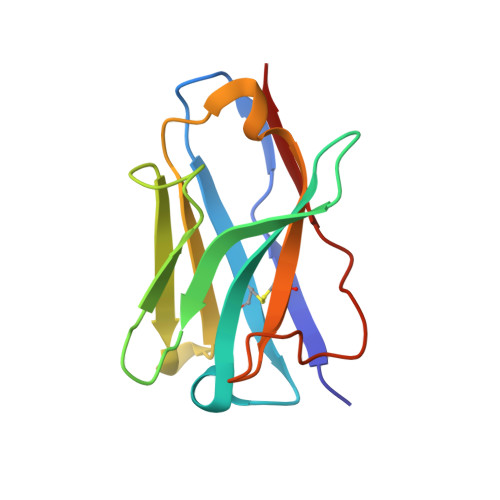Comprehensive Analysis of the Factors Contributing to the Stability and Solubility of Autonomous Human VH Domains.
Barthelemy, P.A., Raab, H., Appleton, B.A., Bond, C.J., Wu, P., Wiesmann, C., Sidhu, S.S.(2008) J Biol Chem 283: 3639-3654
- PubMed: 18045863
- DOI: https://doi.org/10.1074/jbc.M708536200
- Primary Citation of Related Structures:
3B9V - PubMed Abstract:
We report a comprehensive analysis of sequence features that allow for the production of autonomous human heavy chain variable (V(H)) domains that are stable and soluble in the absence of a light chain partner. Using combinatorial phage-displayed libraries and conventional biophysical methods, we analyzed the entire former light chain interface and the third complementarity determining region (CDR3). Unlike the monomeric variable domains of camelid heavy chain antibodies (V(H)H domains), in which autonomous behavior depends on interactions between the hydrophobic former light chain interface and CDR3, we find that the stability of many in vitro evolved V(H) domains is essentially independent of the CDR3 sequence and instead derives from mutations that increase the hydrophilicity of the former light chain interface by replacing exposed hydrophobic residues with structurally compatible hydrophilic substitutions. The engineered domains can be expressed recombinantly at high yield, are predominantly monomeric at high concentrations, unfold reversibly, and are even more thermostable than typical camelid V(H)H domains. Many of the stabilizing mutations are rare in natural V(H) and V(H)H domains and thus could not be predicted by studying natural sequences and structures. The results demonstrate that autonomous V(H) domains with structural properties beyond the scope of natural frameworks can be derived by using non-natural mutations, which differ from those found in camelid V(H)H domains. These findings should enable the development of libraries of synthetic V(H) domains with CDR3 diversities unconstrained by structural demands.
Organizational Affiliation:
Department of Protein Engineering, Genentech, Incorporated, South San Francisco, California 94080.














